The Reef: Books Three & Four
“I feel as if I could trust my happiness to carry me; as if it had grown out of me like wings.” - Anna Leath
At the end of Book Two, Wharton reveals Sophy Viner as the new governess at Givré. But she has even more surprises up her sleeve. How will Darrow and Sophy manage their lives together at Givré? Will their secret be exposed? Does Sophy truly love Owen? We will learn all of this in Books Three and Four, where Wharton gradually destroys the happiness of both couples.
Summary:
Things are tense at the beginning of Book Three. The family is eating dinner, and Darrow senses everyone’s bottled-up emotions. He assumes it’s all because of Owen’s engagement and everyone's worry about how Madame de Chantelle will react when the truth comes out. But Darrow is also nervous. He’s anxious about the secret he's hiding from Anna—the truth about his past relationship with Sophy.
Anna is excited to learn that Darrow knows something about Sophy and keeps asking him for more details. She’s eager to hear his opinion of the new governess, but Darrow continues to hide how much he knows about her. The more he tries to keep this secret, the more damage it will cause when everything finally comes out to Anna and Owen.
“It had been his first business to convince the girl that their secret was safe with him; but it was far from easy to square this with the equally urgent obligation of safe-guarding Anna’s responsibility toward her child. Darrow was not much afraid of accidental disclosures. Both he and Sophy Viner had too much at stake not to be on their guard. The fear that beset him was of another kind, and had a profounder source. He wanted to do all he could for the girl, but the fact of having had to urge Anna to confide Effie to her was peculiarly repugnant to him. His own ideas about Sophy Viner were too mixed and indeterminate for him not to feel the risk of such an experiment; yet he found himself in the intolerable position of appearing to press it on the woman he desired above all others to protect…”
Darrow needs Sophy to understand that their secret must stay a secret. Wharton reveals Darrow’s true feelings about Sophy. He was once charmed by her youth and innocence, but now, as he’s about to make Anna his wife, he considers their affair to be cheap.
“His pride was humbled by the discrepancy between what Sophy Viner had been to him and what he had thought of her. This discrepancy, which at the time had seemed to simplify the incident, now turned out to be its most galling complication. The bare truth, indeed, was that he had hardly thought of her at all, either at the time or since, and that he was ashamed to base his judgement of her on his meagre memory of their adventure.”
Wharton makes it clear to the reader that, regardless of what might happen in the rest of the novel, Darrow will not be rekindling his tryst with Miss Viner. In fact, he’d rather forget it ever happened.
Darrow finds a way to be alone with Sophy so he can talk to her about their secret affair. He insists that he wants to be her friend, and as her friend, he wants to make sure she’s doing the right thing by staying with the Leath family. He insists it’s the wrong choice for her. In response, Sophy explains that he shouldn’t worry because “...let me relieve your fears. I shan’t be Effie’s governess much longer.” Currently, Darrow hasn't been told that the woman Owen is secretly engaged to is Sophy. So, he doesn’t yet understand the full significance of these words.
The two spend quite a bit of time talking privately before they are interrupted by Owen and Effie. Owen often finds them in private tete-a-tetes in these sections, but he seems unaware of what this could imply.
“Darrow’s first idea was that Owen, if he suspected that the conversation was not the result of an accidental encounter, might wonder at his step-mother’s suitor being engaged, at such an hour, in private talk with her little girl’s governess. The thought was so disturbing that, as the three turned back to the house, he was on the point of saying to Owen: “I came out to look for your mother.” But, in the contingency he feared, even so simple a phrase might seem like an awkward attempt at explanation; and he walked on in silence at Miss Viner’s side.”
Meanwhile, Anna is living La Vie en Rose now that Darrow is finally at Givré.
“Anna herself, at the moment, was floating in the mid-current of felicity, on a tide so bright and buoyant that she seemed to be one with its warm waves. The first rush of bliss had stunned and dazzled her; but now that, each morning, she woke to the calm certainty of its recurrence, she was growing used to the sense of security it gave.”
Anna is thrilled to have Darrow with her, to see Owen so happily matched, and to have found a wonderful governess for Effie. She feels on top of the world at the beginning of Book Three. She hopes Owen will be just as happy with Sophy as she is with Darrow. Meanwhile, Owen is a bundle of nerves. He looks to Anna for guidance on what to do now that he’s told his grandmother about his engagement to Sophy. As everyone feared, Madame de Chantelle is very unhappy with the match and even calls in her old friend Adelaide Painter to help her handle this crisis.
Anna feels that it’s finally time to tell Darrow about the engagement. As soon as he is told, it starts to rain at Givré (the weather is always mirroring Darrow’s moods). Darrow goes for a long walk in the rain to clear his mind.
“Hitherto he had felt for Sophy Viner’s defenseless state a sympathy profoundly tinged with compunction. But now he was half-conscious of an obscure indignation against her. Superior as he had fancied himself to ready-made judgments, he was aware of cherishing the common doubt as to the disinterestedness of the woman who tries to rise above her past. No wonder she had been sick with fear on meeting him! It was in his power to do her more harm than he had dreamed…”
He wanted to stop this wedding between Owen and Sophy. How can this ever work: his former lover married to his stepson?
”Darrow himself was in fact the only person who might possibly turn her from her purpose: Madame de Chantelle, at haphazard, had hit on the surest means of saving Owen—if to prevent his marriage were to save him! Darrow, on this point, did not pretend to any fixed opinion; one feeling alone was clear and insistent in him: he did not mean, if he could help it, to let the marriage take place.”
Madame de Chantelle enlists his help to break the engagement. She’s furious about it and knows her objections won’t stop Owen from marrying Sophy.
“My grandson, Mr. Darrow, calls me illogical and uncharitable because my feelings toward Miss Viner have changed since I’ve heard this news. Well! You’ve known her, it appears, for some years: Anna tells me you used to see her when she was a companion, or secretary or something, to a dreadfully vulgar Mrs. Murrett. And I ask you as a friend, I ask you as one of us, to tell me if you think a girl who has had to knock about the world in that kind of position, and at the orders of all kinds of people, is fitted to be Owen’s wife. I’m not implying anything against her! I liked the girl, Mr. Darrow.... But what’s that got to do with it? I don’t want her to marry my grandson.”
Darrow tells her that he can’t get involved, but we understand he wants to separate them just as much as she does. Again, Darrow is asked to share his opinion of Sophy, this time by Madame de Chantelle, because he knew her before coming to Givré. Once more, Darrow has to hide how well he knows the new governess. In the end, Madame de Chantelle is disappointed by his hesitation to assist her with this very troubling issue. Despite all his protests, the next morning, Darrow tries to plant seeds of doubt in Anna’s mind about Sophy and her suitability as a wife for Owen. To Darrow’s surprise, Anna remains firm in supporting this match.
Their conversation is interrupted when Anna finds out her daughter is sick. Owen rushes out of the car to get the surgeon, and Anna asks Darrow to find Sophy so he can gather the necessary supplies for the surgeon. Darrow takes this opportunity to talk to Sophy about her engagement to Owen. He makes it clear he doesn’t think this engagement is good for either of them. Darrow’s main criticism of Owen is that he’s just a boy—“a charming, wonderful boy, but with no more notion than a boy how to deal with the inevitable daily problems…the trivial, stupid, unimportant things that life is chiefly made up of.”
Once again, Darrow presents himself as a friend and a potentially good guy. He tells her he wants to make sure she’s doing what’s “best for her.” He acts like he cares about her well-being, but in reality, it’s all a scheme to keep their affair secret from Anna.
Their argument escalates as Sophy defends her engagement and feels insulted by Darrow’s objections. It concludes with Darrow questioning whether Sophy truly loves Owen. Sophy remains steadfast in her commitment to marry him. Finally, they hear Owen’s car pulling up with the surgeon, and Sophy returns to the house alone.
The surgeon comes and goes, and immediately after, Miss Painter arrives. Madame de Chantelle rushes to seek her friend's support in stopping this inapporpriate engagement, but once again, her efforts are thwarted. Miss Painter believes that separating Owen from his love will only lead to more trouble. In fact, Miss Painter seems to enjoy the match simply because Sophy is American and “she somehow regards the match as a protest against the corruption of European morals.”
Near the end of Book Three, we finally see how Darrow truly feels about Anna. The two spend an hour together in her rooms, where he can “give himself more to the joy of Anna’s presence.” He seems to admit her as much as she does him. He’s happy to “sit by the hearth and watch her quiet movements.” Unlike his time alone with Sophy, there’s no hint of sexual passion in his admiration of Anna. Instead, she’s a decorative object to be admired.
Finally, Book Three ends with a family dinner, Effie included, to celebrate the double engagement. Darrow realizes this will be the first time Sophy has dined with them since he arrived at Givré. When she arrives downstairs, she’s wearing the same dress she wore in Paris, and he’s once again confronted with memories of their affair.
“The accident of her having fallen into the same attitude, and of her wearing the same dress, gave Darrow, as he watched her, a strange sense of double consciousness. To escape from it, his glance turned back to Anna; but from the point at which he was placed his eyes could not take in the one face without the other, and that renewed the disturbing duality of the impression.”
As long as Sophy Viner is in his life, their affair will haunt his relationship with Anna.
Book Four begins on Darrow’s second to last day at Givré, and he ensures he spends the morning alone with Anna to finalize their wedding plans. Anna is deeply in love with Darrow. “She thought she now knew exactly how and why she loved Darrow, and she could see her whole sky reflected in the deep and tranquil current of her love.” But a Wharton heroine cannot be happy in love for long.
The next morning, Sophy visits Anna in her rooms. Anna notices she’s been crying and wrongly assumes she’s upset over Madame de Chantelle’s objections to her marrying Owen. But she soon finds out that Sophy wants to leave Givré to visit her friends, the Farlows. She wanted to tell Anna first before talking to Owen. Sophy is about to leave Anna’s rooms when Owen arrives.
Sophy tells Owen that she will be leaving today to meet her friends. The suddenness of her departure surprises Anna and Owen. Owen insists on going to Paris with Sophy, but Sophy refuses. Eventually, it comes out that Sophy wants to end her engagement. Her plan was to visit her friends to create some distance between herself and Owen. She then planned to write to break things off. Owen is understandably upset by this, and in his anger, he reveals how he’s seen Sophy and Darrow “shut up alone” numerous times, suggesting that something is going on between the two. This would explain why Darrow has been so against the match and also the change in Sophy since his arrival at Givré. Anna tries to argue that Darrow barely knew Sophy, but Owen questions how true this is.
Things come to a head when Darrow enters the room. Anna finds strength in his presence, hoping he can clear things up. Anna says to him: “Owen has taken it into his head that you’ve influenced Miss Viner to break her engagement.” Darrow is shocked and asks if she really broke off the engagement, to which Sophy mutters, “yes.”
Meanwhile, Anna watches how Darrow and Sophy interact. She’s convinced that their reactions will give her the answers she needs.
“If there’s nothing between them, they’ll look at each other; if there is something, they won’t;” and as she ceased to speak she felt as if all her life were in her eyes.
When Darrow and Sophy seem to be avoiding looking at each other, Anna knows there’s truth to Owen’s accusations.
Anna questions Darrow about his “influence” over Sophy and wonders how well he truly knows her. He denies everything, sticking to his original story - he met her once at Mrs. Murrett’s; that’s as far as their acquaintance goes. According to Darrow, Owen looking for any excuse to explain Sophy leaving:
“I don’t care a straw what he says of me! In such a situation a boy in love will snatch at the most far-fetched reason rather than face the mortifying fact that the lady may simply be tired of him.”
Darrow explains that he spent all that time alone with Sophy as a way to get to know her better. He did it so he could help Owen, as Anna had wanted him to.
Of course I’ve talked with her alone—I’ve talked with her as often as I could. I’ve tried my best to find out if you were right in encouraging Owen to marry her.”
Somehow, Anna convinces herself that the only person who might be able to change Sophy’s mind about ending the engagement is Darrow (incredibly flawed logic, but it is what it is). She sends him to make an appeal to Sophy on her behalf.
“Appeal to her on the ground that I’m almost Owen’s mother, and that any estrangement between you and him would kill me. She knows what he is—she’ll understand. Tell her to say anything, do anything, she wishes; but not to go away without speaking, not to leave that between us when she goes!”
Darrow dutifully fulfills Anna’s request to meet with Sophy, where she confesses to Darrow that she doesn’t love Owen. She cannot see herself married to a man she doesn’t love. She admits she’s in love with Darrow. She can’t stand the thought of spending her life married to Owen with Darrow as her stepfather-in-law. Darrow tries to persuade her to forget what happened between them in Paris, but she cannot.
“You don’t understand. I don’t want anything to change. I don’t want to forget—to rub out. At first I imagined I did; but that was a foolish mistake. As soon as I saw you again I knew it.... It’s not being here with you that I’m afraid of—in the sense you think. It’s being here, or anywhere, with Owen.” She stood up and bent her tragic smile on him. “I want to keep you all to myself.”
Sophy doesn’t expect Darrow to love her back. She doesn’t want to drag everyone into this trouble. She just wants to leave Givré and put some distance between herself and Darrow.
“Don’t for a minute think I’m sorry! It was worth every penny it cost. My mistake was in being ashamed, just at first, of its having cost such a lot. I tried to carry it off as a joke—to talk of it to myself as an ‘adventure’. I’d always wanted adventures, and you’d given me one, and I tried to take your attitude about it, to ‘play the game’ and convince myself that I hadn’t risked any more on it than you. Then, when I met you again, I suddenly saw that I had risked more, but that I’d won more, too—such worlds! I’d been trying all the while to put everything I could between us; now I want to sweep everything away. I’d been trying to forget how you looked; now I want to remember you always. I’d been trying not to hear your voice; now I never want to hear any other. I’ve made my choice—that’s all: I’ve had you and I mean to keep you.” Her face was shining like her eyes. “To keep you hidden away here,” she ended, and put her hand upon her breast.”
Darrow thought he was giving Sophy “a few days of harmless pleasuring” when they were in Paris. He never considered what those days might mean to a young woman like Sophy.
After talking with Darrow, Sophy finds Anna again to “explain everything.” Sophy blames all the inspections from Miss Painter and, of course, Madame de Chantelle for her behavior. It’s all too overwhelming for her, and she needs space. Anna is hopeful that, with time, Sophy will take Owen back. All Owen wants is to keep the truth about Sophy’s departure hidden from his grandmother.
Anna confesses to Darrow that she was briefly worried Owen was right about there being more to Darrow’s relationship with Sophy. As she tells him how foolish she’s been, Anna notices a specific look in his eyes. The look confirms all her fears–the woman in the pink cloak Owen saw with Darrow was really Sophy. Darrow tries to spin another story for Anna to explain away his being at the theater with Sophy. He admits to meeting Sophy again in Paris and going to the theater with her. He says he kept this a secret because Sophy wished him to. He didn’t want everyone to know she’d quarreled with Mrs. Murrett. He crafts another web of lies to protect Anna from the truth, which he knows will crush her.
This time, Anna isn’t convinced by his lies. She senses there is more to the story and realizes that Sophy loves Darrow and won’t let him go. Darrow simply responds that she has already given him up. For a while, Anna convinces herself that Sophy fell in love with Darrow because of his kindness.
“...Darrow, meeting her in this distracted hour, had pitied, counselled, been kind to her, with the fatal, the inevitable result. There were the facts as Anna made them out: that, at least, was their external aspect, was as much of them as she had been suffered to see; and into the secret intricacies they might cover she dared not yet project her thoughts.”
Anna and Sophy have a final confrontation before she leaves Givré. Anna wants to know if Sophy will rekindle her engagement to Owen. But Sophy admits that she can’t. Anna asks if Sophy is in love with anyone else, to which Sophy replies: “I wanted it—I chose it. He was good to me—no one ever was so good!”
Sophy and Miss Painter leave, and Anna is left to figure out what to do with the turmoil of emotions stirred up by her final talk with Sophy. How is she supposed to handle things with Darrow now that she knows something really happened between them?
Anna confronts Darrow, and he explains:
“I was on my way to you—after repeated delays and postponements of your own making. At the very last you turned me back with a mere word—and without explanation. I waited for a letter; and none came. I’m not saying this to justify myself. I’m simply trying to make you understand. I felt hurt and bitter and bewildered. I thought you meant to give me up. And suddenly, in my way, I found some one to be sorry for, to be of use to. That, I swear to you, was the way it began. The rest was a moment’s folly ... a flash of madness ... as such things are. We’ve never seen each other since...”
Anna struggles to understand what Darrow means when he says “a moment’s folly, a flash of madness.” She’s too ignorant of this side of a man’s life.
“How did people enter on such adventures, how pass out of them without more visible traces of their havoc? Her imagination recoiled from the vision of a sudden debasing familiarity: it seemed to her that her thoughts would never again be pure…”
In the end, Anna is heartbroken to realize that Sophy has known Darrow in ways she never will. With a broken heart, Anna says goodbye to Darrow.
And we must wait to see how things will end for Anna, Darrow, Sophy, and Owen.
Fairytale Ladies and the Knights Who Disappoint Them:
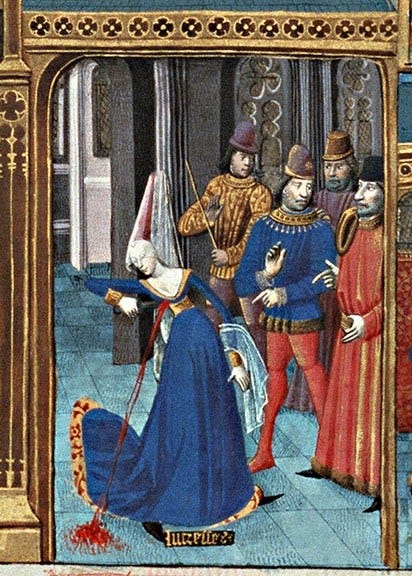
Wharton examines two types of femininity: Anna, the refined woman who cannot stray from the strict social rules she was raised with, and Sophy, the more modern woman who was not brought up to follow the social codes of the elite and is valued differently as a result. We can see how these two women are valued differently by looking at how Darrow treats them in the novel. In any relationship of that time, women bear most of the risk. Their reputations can be irreparably damaged. Men are not held to the same strict moral standards. It’s expected that men will quietly seek sexual fulfillment outside of marriage. It’s unlikely that someone like Darrow would be shunned by society for having an affair with an unmarried young woman. Unfortunately, the same isn’t true for a poor, unconnected woman like Sophy.
In the first two books, Sophy is captivated by Darrow’s kindness to the extent that she falls in love with him. While Darrow might enjoy Sophy’s youthful honesty and enthusiasm, he sees her only as a temporary presence. He relishes her company while it lasts, makes the most of it, and then moves on without looking back. She is simply an object of sexual desire. He doesn’t worry about what might happen to Sophy in the future, and he probably would have forgotten her entirely if he hadn’t run into her again at Givré. In contrast, Darrow shows little romantic interest in Anna. Unlike Sophy, she’s a “lady,” and Darrow “prizes her like a fine object of art of a spirited horse he plans to own” (Ammons, 1976).
One thing both of these women share is the fairy-tale idea of love. They both believe a man can save them from their current lives. Sadly, being rescued by a man like Darrow is ultimately unhelpful—marriage doesn’t guarantee salvation. “If a woman looks to a man as her deliverer, she accepts a system where men hold more power and must see women’s subordination as fair and moral, which supports the double standard and male ownership” (Ammons, 1976). Being rescued by a knight in shining armor is less about saving women and more about the male instinct to own. This is a fantasy women need to grow out of.
Anna and Sophy come from different worlds. They try to find escape through men. Sophy falls for Darrow, but she hopes to find salvation through marriage to Owen. Meanwhile, Anna feels like she’s finally found emotional liberation in her relationship with Darrow, only to have her understanding of love undermined by her ignorance of the realities of the world. Anna is the product of her bourgeois upbringing, which shielded her from ugliness like extramarital affairs. In Book Five, Anna will attempt to shift into the world of Sophy Viner. She will attempt to shed her rigid moral code and become more like the woman Darrow had an affair with, but she will not be successful (Inness, 1993). But we will discuss this more in the final discussion post.
It’s important to remember that in this novel, Wharton is exploring her emotions following her affair with Morton Fullerton. Wharton embodies both Anna, the dutiful wife conforming to societal expectations, and Sophy, the sexually liberated woman. Unfortunately, she doesn’t find happiness in either role. How do you view Anna and Sophy? Does this differ from Darrow’s perspective on these women? Do you feel either of these women has control over their lives? I’d love to hear your thoughts in the comments.
Passion’s Way (1999):
Before we conclude this post, I want to share a few thoughts on the 1999 film Passion’s Way, also known as the movie adaptation of The Reef. I watched it over the weekend and was very disappointed; I wouldn’t recommend it. I found the portrayal of Sophy particularly upsetting. In the novel, Sophy feels calm and composed. She shows youthful energy in Paris, but when she’s at Givré, there’s a reserved quality about her that isn’t present at the start of the novel. She’s pretty even-tempered, even during emotional discussions with Darrow. In the film, however, Sophy seems to be on the verge of tears every time she speaks. The movie also removes the tension and suspense that Wharton skillfully built into the novel. We learn right away that Sophy is the new governess, whereas Wharton reveals this gradually, unveiling it to both the reader and Darrow, which is lost in the film. The only aspect I think they got right is the portrayal of Darrow. Timothy Dalton perfectly captures Darrow’s sense of masculine entitlement and arrogance.
Wrapping-up:
Next time, we'll finish our discussion of The Reef. Until then, I’d love to hear your thoughts on the novel, so please leave a comment below. And I sincerely thank you for your patience as I get back to writing. It’s been a hectic and emotional few weeks, but it’s time to return to some version of normal.
I look forward to discussing this book with you throughout the month of August. Thank you so much for reading along with me.
Happy Reading!
Sources:
Ammons, E. (1976). Fairy-Tale Love and The Reef. American Literature, 47(4), 615–628. https://doi.org/10.2307/2924840
Inness, S. A. (1993). Nature, Culture, and Sexual Economics in Edith Wharton’s “The Reef.” American Literary Realism, 1870-1910, 26(1), 76–90. http://www.jstor.org/stable/27746563



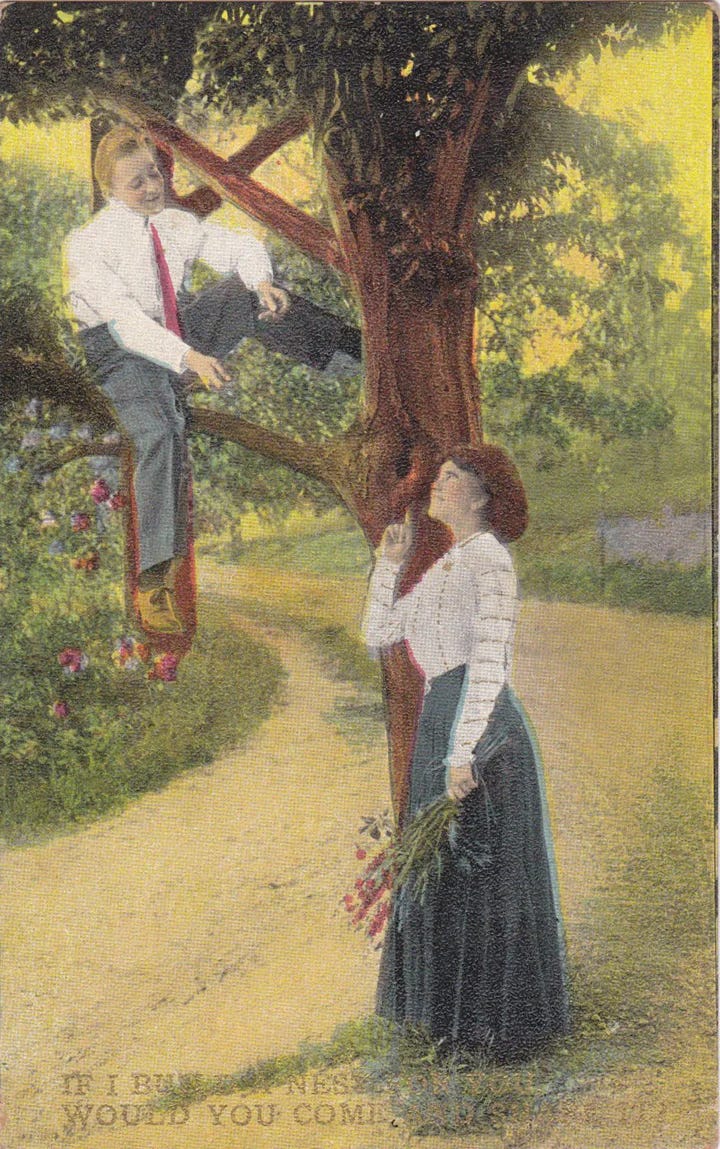
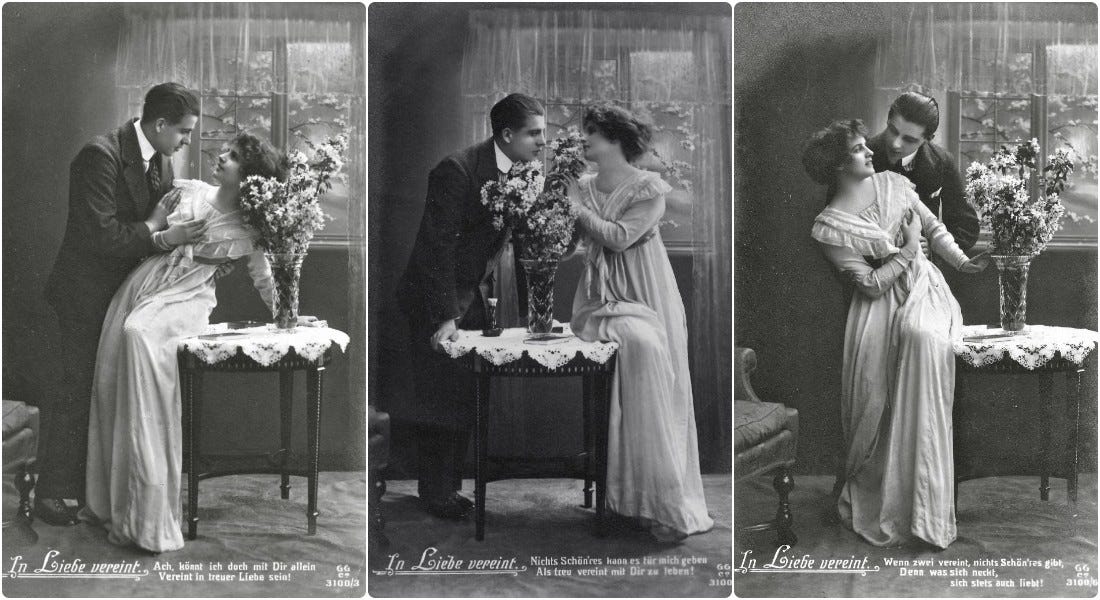
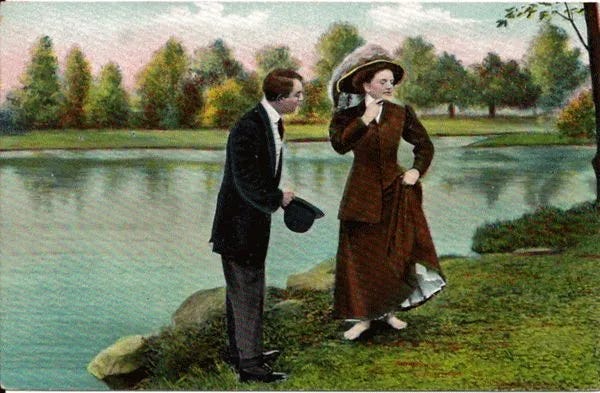
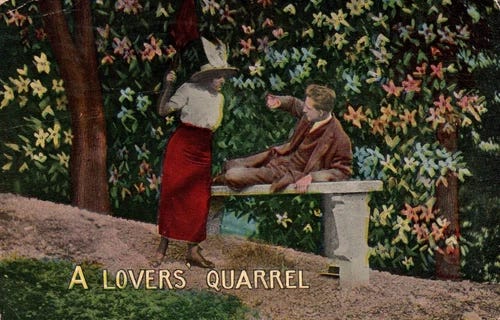
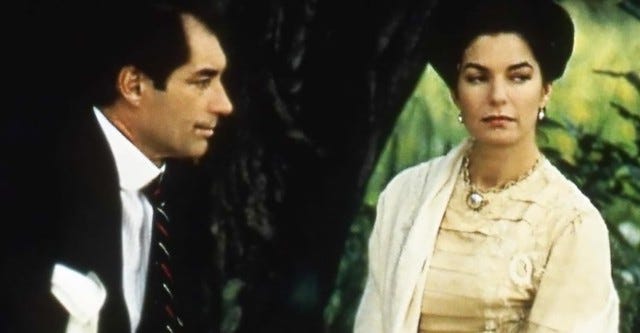
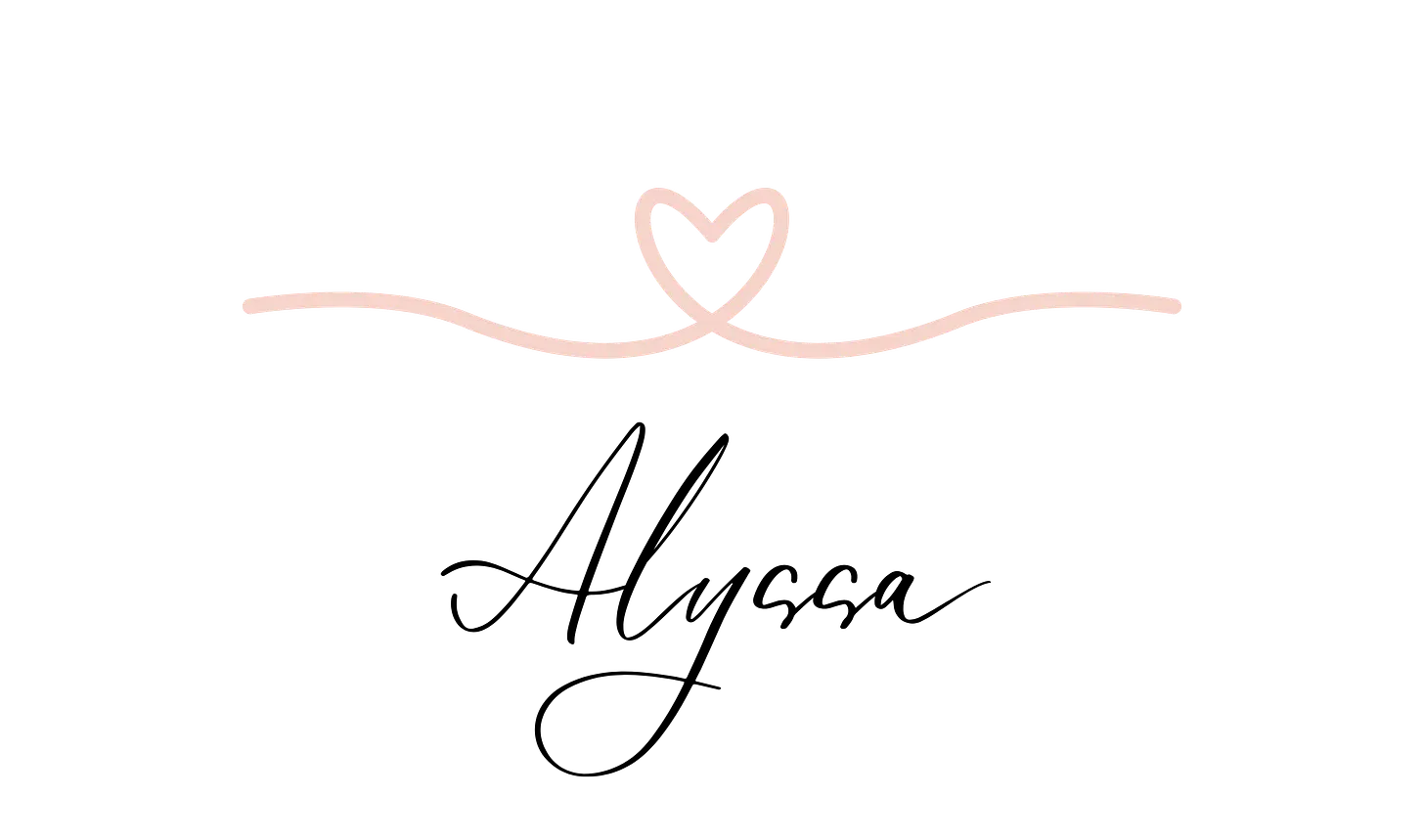
The more you come to know Sophy and Anna, and the more you come to know George, the more you feel he doesn't deserve either one of them. It's a bad sign when your character spends so much of his time trying to remember his lies and keep them straight, while at the same time trying to persuade another character to go along with his cover story. Perhaps it's because he's a diplomat that George is as successful at it as he is for most of the novel.
Anna Leath has the attraction of being a mature woman with a young daughter and a beautiful home and garden estate in the French countryside. She is the widow of a man who collected antique snuff-boxes for a hobby which I think is Edith Wharton's way of letting us know he was trivial-minded and a bit of a bore. As with Sophy, Anna gives the impression of being a woman who is not looking for anything particularly special in a husband, just a man who will love her and cherish her and be willing to share his life with her. Samuel Johnson once said that being married twice is an example of the triumph of hope over experience, but that's what Anna seems to be looking for. The only thing I question slightly is the fact that she hasn't seen George Darrow for twelve years, but only three months after meeting him at a social gathering after losing her husband, she seems eager to marry him. In her place, I would want to make sure George wasn't just a fortune-hunter, which might take longer than three months. And can Anna really be sure he'll be a good stepfather to Effie in the long run, and do Anna and George plan on having children of their own; I'm not sure that ever comes up for discussion.